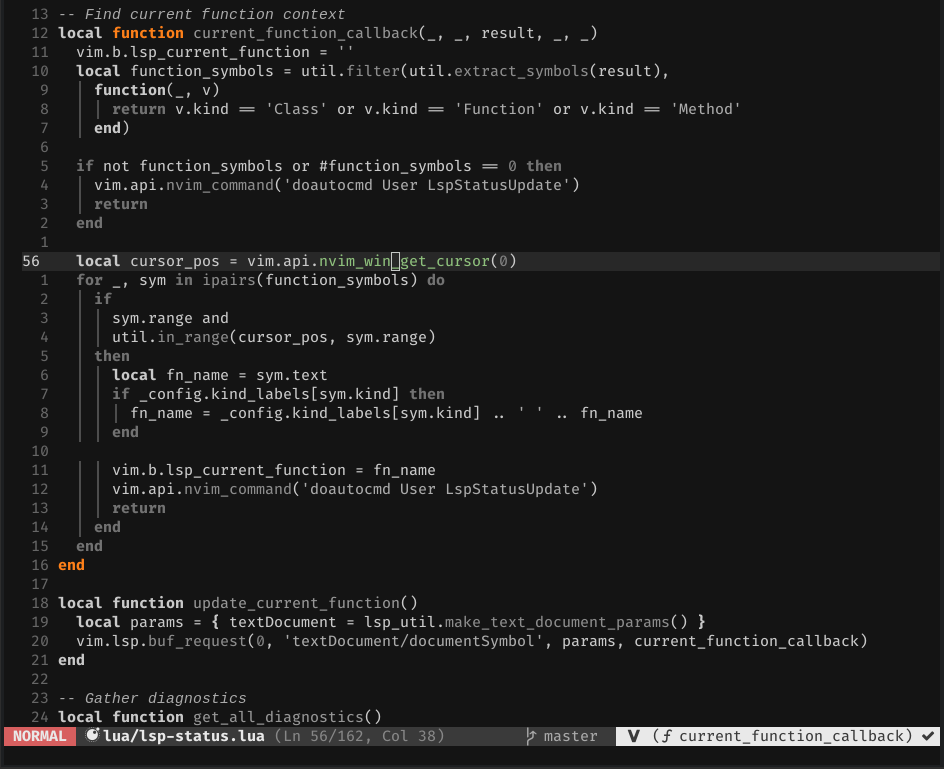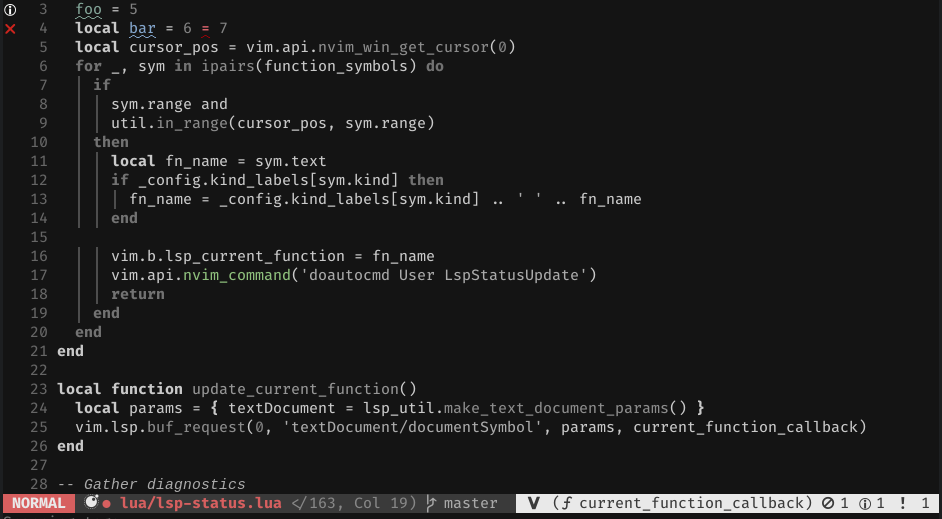nvim-lua / Lsp Status.nvim
Programming Languages
Projects that are alternatives of or similar to Lsp Status.nvim
lsp-status.nvim
This is a Neovim plugin/library for generating statusline components from the built-in LSP client.
Notices
-
2021/03/13: Some users report success using the Google "Noto Emoji" font for
status_symbolandindicator_hint. - 2020/11/19: Please note that the default diagnostics symbols require Font Awesome or a Nerd Font. You may also change the diagnostics symbols as shown in the configuration section.
-
2020/11/13: Due to this PR, you must update to
the latest Neovim
masterto avoid errors with the old diagnostics API. See issue #19 for more information. -
2020/05/25: There has been a minor breaking change to the API:
extension_callbacksis now namedextensions. There have also been a number of additions and improvements; see the below (specifically Configuration and Example Use) for details.
Contents
Examples
Show the current containing function (like b:coc_current_function):

Easily access diagnostic counts:

Show progress messages from servers:

Installation
You will need a version of Neovim that includes the built-in LSP client (right now, that means
nightly). Use your preferred package/plugin manager. With
vim-packager, this looks like:
call packager#add('nvim-lua/lsp-status.nvim')
Usage
The plugin provides several utilities:
update_current_function() -- Set/reset the b:lsp_current_function variable
diagnostics() -- Return a table with all diagnostic counts for the current buffer
messages() -- Return a table listing progress and other status messages for display
register_progress() -- Register the provided handler for progress messages
register_client() -- Register a client for messages
-- Integrate misc. LS protocol extensions into the messages framework
-- Each extension table contains a set of handlers and a setup() function
-- returning said handlers
extensions = { clangd, pyls_ms }
-- Set up a client for use with lsp-status. Calls register_client() and sets up
-- buffer autocommands
on_attach(client)
config(config_vals) -- Configure lsp-status
-- Table of client capabilities extended to signal support for progress messages
capabilities
status() -- One example out-of-the-box statusline component (as shown in the images above)
Protocol Extensions
lsp-status.nvim supports messaging-related protocol extensions offered by
clangd and Microsoft's Python language
server (python/setStatusBarMessage,
python/beginProgress, python/reportProgress, and python/endProgress). To use these extensions,
register the handlers provided in the extensions table (the keys for the handlers are
the relevant LSP method name).
Note: For clangd, you must also set init_options = { clangdFileStatus = true }.
New: You can also call lsp_status.extensions.<server name>.setup() to return the full set of
handlers, as shown below.
Configuration
You can configure lsp-status.nvim using the config function, which takes a table of
configuration values. The following configuration options are supported:
-
kind_labels: An optional map from LSP symbol kinds to label symbols. Used to decorate the current function name. Default:{} -
select_symbol: An optional handler of the formfunction(cursor_pos, document_symbol)that should returntrueifdocument_symbol(aDocumentSymbol) should be accepted as the symbol currently containing the cursor.
For example, the sumneko lua server sends
valueRange (which is not specified in the protocol) to give the range for a function's start and
end. To respect valueRange, you can use the following configuration:
lsp_status.config {
select_symbol = function(cursor_pos, symbol)
if symbol.valueRange then
local value_range = {
["start"] = {
character = 0,
line = vim.fn.byte2line(symbol.valueRange[1])
},
["end"] = {
character = 0,
line = vim.fn.byte2line(symbol.valueRange[2])
}
}
return require("lsp-status.util").in_range(cursor_pos, value_range)
end
end
}
-
current_function: Boolean,trueif the current function should be updated and displayed in the default statusline component. -
indicator_*-group: strings to show as diagnostic warnings. If you don't have Nerd/Awesome Fonts you can replace defaults with ASCII chars like this:
-- Put this somewhere near lsp_status.register_progress()
lsp_status.config({
indicator_errors = 'E',
indicator_warnings = 'W',
indicator_info = 'i',
indicator_hint = '?',
indicator_ok = 'Ok',
})
Example Use
Here is an example configuration (also using nvim-lsp)
showing how lsp-status can be integrated into one's statusline and other LSP configuration.
In any Lua file you load:
local lsp_status = require('lsp-status')
-- completion_customize_lsp_label as used in completion-nvim
-- Optional: customize the kind labels used in identifying the current function.
-- g:completion_customize_lsp_label is a dict mapping from LSP symbol kind
-- to the string you want to display as a label
-- lsp_status.config { kind_labels = vim.g.completion_customize_lsp_label }
-- Register the progress handler
lsp_status.register_progress()
Before calling setup for each relevant LSP client:
-- Set default client capabilities plus window/workDoneProgress
config.capabilities = vim.tbl_extend('keep', config.capabilities or {}, lsp_status.capabilities)
In an on_attach function for each relevant LSP client:
-- Register client for messages and set up buffer autocommands to update
-- the statusline and the current function.
-- NOTE: on_attach is called with the client object, which is the "client" parameter below
lsp_status.on_attach(client)
Specific client configuration (following nvim-lsp conventions):
clangd = {
handlers = lsp_status.extensions.clangd.setup()
},
pyls_ms = {
handlers = lsp_status.extensions.pyls_ms.setup()
},
LSP statusline segment
An example statusline segment is provided in
lua/lsp-status/statusline. You are encouraged to read the source
and develop your own statusline segment, but if you'd like something reasonable out-of-the-box, you
can call lsp_status.status() somewhere in your statusline definition (make sure you have
require'd the lsp-status module too!)
All together, now
Here's a complete example:
lua << END
local lsp_status = require('lsp-status')
lsp_status.register_progress()
local lspconfig = require('lspconfig')
-- Some arbitrary servers
lspconfig.clangd.setup({
handlers = lsp_status.extensions.clangd.setup(),
init_options = {
clangdFileStatus = true
},
on_attach = lsp_status.on_attach,
capabilities = lsp_status.capabilities
})
lspconfig.pyls_ms.setup({
handlers = lsp_status.extensions.pyls_ms.setup(),
settings = { python = { workspaceSymbols = { enabled = true }}},
on_attach = lsp_status.on_attach,
capabilities = lsp_status.capabilities
})
lspconfig.ghcide.setup({
on_attach = lsp_status.on_attach,
capabilities = lsp_status.capabilities
})
lspconfig.rust_analyzer.setup({
on_attach = lsp_status.on_attach,
capabilities = lsp_status.capabilities
})
END
" Statusline
function! LspStatus() abort
if luaeval('#vim.lsp.buf_get_clients() > 0')
return luaeval("require('lsp-status').status()")
endif
return ''
endfunction
Status
This plugin is "complete" - it works in all the ways it was originally intended to, and it doesn't seem to break. That said, it hasn't been tested much, and I'm open to adding new features if others want them.
One thing that probably should be added is proper documentation of some sort. The code could also stand to be cleaned up.
Contributing
Bug reports and feature requests are welcome! PRs are doubly welcome!
